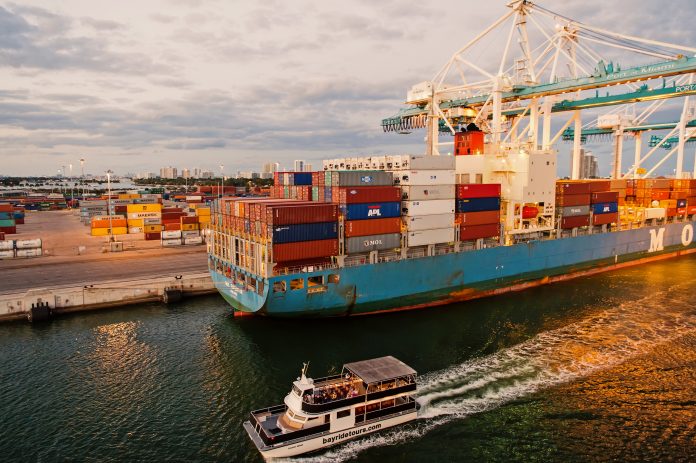Mark Porter, Maritime Business Development Manager at GeoSpock, discusses how the Poseidon Principles provides an incentive for shipping firms to demonstrate their eco commitment
More than any other sector, transport is under pressure to boost efficiency and cut emissions. According to the European Environment Agency, the transport industry is comfortably the biggest polluter, responsible for over a quarter of emissions. While attention has focused on the automotive and aviation industries, the maritime sector is still responsible for 13.3% of greenhouse gas emissions.
Shipping is one of the world’s most polluting industries. More than 90,000 ships crisscrossed the world last year, burning nearly two billion barrels of heavy fuels. If left unchecked, maritime pollution could produce 17% of all emissions by 2050.
The IMO has already introduced IMO 2020, a new regulation aimed at reducing sulphur emissions and introducing cleaner fuels. Now, with the EU’s ambition to reach net-zero emissions by 2050, attention is turning to decarbonisation in maritime – something which will take unparalleled collaboration and innovation to achieve.
A race against time
Unfortunately, technology that allows vessels to run entirely off renewable energy does not yet exist and is unlikely to be developed and implemented by 2050. Ships are hugely capital-intensive with a typical life span of 25-30 years. To deliver on ambitious climate targets, zero-emission vessels will need to enter the fleet by 2030. That means there is just ten years to develop the fuels, technologies and infrastructures to meet the 2050 target.
With the maritime industry in a race against time, the focus needs to be on how to reduce emissions levels through innovative action that can have a transformative impact on the image of the industry. There are highly progressive pioneers in the maritime industry who are already investing in the fuels and digital technologies of tomorrow. When ships go under the Rotterdam bridge, sensors detect and report emissions. The Baltic Exchange is developing the world’s most advanced maritime database, aiming to centralise information and revolutionise the industry. Others are simply dipping a toe in the water while keeping a close eye on profits.
However, the introduction of the Poseidon Principle will provide an incentive for shipping firms that are relying on finance from banks to demonstrate their eco commitment.
A change in maritime financing: The Poseidon Principle
Driven by public and employee sentiment, financial markets are changing, with banks assessing their clients’ environmental, social impact.
Announced at this year’s Global Maritime Forum, the Poseidon Principle aims to link finance availability with emissions, limiting lending to high or inefficient emitters and making funding more readily available to those that can prove they have a low emissions footprint. It’s currently made up of European banks and represents 20 per cent of the maritime funding market.
Clearly there is no overnight fix, but Poseidon forces the industry to take the environmental challenge seriously and consider its consequences. Money will, theoretically at least, start to flow more freely to those making environmentally friendly decisions. For the first time, banks will be able to measure the sustainability of their maritime stock. They will be able to track sustainability changes over time and end associations with those that aren’t acting.
Technological innovation: Geospatial data
To continue accessing finance, it’s time for shipping builders and managers to ask themselves: what are the most proactive steps we can take improve efficiency? What are the implications if we do nothing?
Demonstrating compliance with the Poseidon Principle will mandate shipping companies to use the vast hordes of data being created to provide transparency into current emission levels and use this insight to demonstrate how they will continue to reduce their carbon footprint. Gathering and monitoring maritime data is the most effective first step in curbing emissions. The next step is finding the means to ingest, analyse, report and optimise journey and fuel usage based on the information available.
Maritime has the opportunity to tackle sustainability by embracing data and developing a hub for maritime intelligence. Only then can it understand emissions and tackle them as effectively as possible. By combining location, fuel and emissions data from ships, companies, ports and governments then it’s possible to deliver real-time visibility into operations and decide what works and plan accordingly. For the first time, these often conflicting entities, all have the ability to conclusively prove and improve efficiency, cutting emissions and saving money.
The future
Above the obvious, Poseidon has a number of equally important benefits. Firstly, it aims to create a standardised metric for emissions – measuring intensity, design and use to generate an overall picture of emissions over time.
Secondly, the principle understands the fundamental flaw of the industry – notably, that the journey to zero-emission must be based around driving efficiency and optimisation. An overnight fix in shipping simply does not exist, and even if it did, it would take 30 years to implement. The industry must seek to create incentives and technologies that can improve efficiency today, as well as tomorrow.
The only way to overhaul the industry and meet the challenge ahead is to move as a collective. All agencies must invest in innovation and look to incentivise change. The next step is a centralised big data platform that creates a picture of shipping movements, optimises routes, identifies pollutant activities and areas, and crucially proves the effectiveness of changes. Ultimately, maritime needs facts to act and it needs to be focused on a singular goal.











